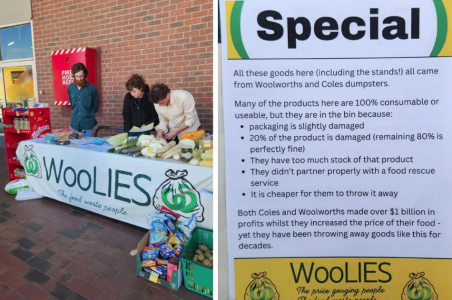Discover the shocking reason why thrifty Aussies are digging through supermarket dumpsters!
By
VanessaC
- Replies 5
In an era of rising grocery costs and escalating food waste, some Australians have taken matters into their own hands.
Many have turned to supermarket dumpsters to salvage perfectly good items that have been discarded, transforming what was once considered rubbish into a treasure trove of savings.
The Grassroots Action Network Tasmania (GRANT) has been at the forefront of this movement.
After days of rummaging through the dumpsters of Woolworths and Coles stores, the group set up a stall in front of a Hobart Woolworths store to distribute the salvaged goods for free.
From fresh produce to back-to-school items, the group had an impressive array of 'liberated' products on offer.
Despite the immediate call to the police by Woolworths staff, GRANT Organiser Amy Booth reported that the responding officers allowed the group to continue their distribution.
Booth highlighted that supermarkets have been discarding edible or usable products for decades, and dumpster diving has been a response to this wasteful practice for just as long.
'This is not a new issue,' she said.
'The goal for [Monday’s] action was to shame the duopoly as well as ensure that food is being distributed to people who want it/need it.'
While some products are discarded due to contamination, spoilage, or damage, Booth pointed out that supermarkets often dispose of whole cartons of eggs if just one egg is broken.
Instead of marking down the price, these perfectly good eggs are thrown away.
Similarly, if one jar of tomato passata breaks in transit, the entire batch might be discarded to avoid the time-consuming task of ensuring the remaining jars are safe for customers.
Booth also mentioned finding items like moisturisers—still sealed and years away from their use-by date—in the trash.
'There [are]…so many reasons why things get thrown in the bin when the vast majority of the product is completely still edible and still usable,' Booth claimed.
'But because of business rules, legislation, liability, and them not wanting to get sued, it goes in the bin.'
'I’m sure business people will go “That’s understandable,” but as… consumers and logical people, we see…that it’s a massive market failure.'
According to food rescue charity OzHarvest, Australia wastes more than 7.6 million tonnes of food every year, with over 2.5 million tonnes coming from farms and primary producers.
One of the main reasons for this staggering amount of waste is the strict supermarket standards on the size and appearance of fresh produce, which often leads to the disposal of perfectly edible items.
While acknowledging that Coles and Woolworths donate food to charities such as OzHarvest and Foodbank, Booth argued that a complete overhaul of Australia’s food systems is necessary.
'It’s a big conversation about our farms…about the types of food…about the supply chain,' she said.
'There’s just a lot more to work on as a country that has chosen these two specific [companies] to have too much market concentration, given all the waste is still happening.'
In response to these claims, a Woolworths spokesperson stated that the retailer is committed to reducing food waste across its stores.
In the 2023 financial year, Woolworths reported that 80 per cent of their food waste has been diverted from landfills to food relief partners, farmers, and organic recycling.
'We aim to only discard food that can’t be donated to charity, often for food safety reasons,' the spokesperson said.
Meanwhile, a Coles spokesperson also highlighted the company's efforts, stating that it had donated almost 20,000 tonnes—around more than 39 million meals—to SecondBite and Foodbank in the last financial year.
'We have other food waste solutions, including donations to farmers and animal or wildlife services as well as organic food collections,' Coles said.
 What are your thoughts on this issue, members? Share them with us in the comments below.
What are your thoughts on this issue, members? Share them with us in the comments below.
Many have turned to supermarket dumpsters to salvage perfectly good items that have been discarded, transforming what was once considered rubbish into a treasure trove of savings.
The Grassroots Action Network Tasmania (GRANT) has been at the forefront of this movement.
After days of rummaging through the dumpsters of Woolworths and Coles stores, the group set up a stall in front of a Hobart Woolworths store to distribute the salvaged goods for free.
From fresh produce to back-to-school items, the group had an impressive array of 'liberated' products on offer.
Despite the immediate call to the police by Woolworths staff, GRANT Organiser Amy Booth reported that the responding officers allowed the group to continue their distribution.
Booth highlighted that supermarkets have been discarding edible or usable products for decades, and dumpster diving has been a response to this wasteful practice for just as long.
'This is not a new issue,' she said.
'The goal for [Monday’s] action was to shame the duopoly as well as ensure that food is being distributed to people who want it/need it.'
While some products are discarded due to contamination, spoilage, or damage, Booth pointed out that supermarkets often dispose of whole cartons of eggs if just one egg is broken.
Instead of marking down the price, these perfectly good eggs are thrown away.
Similarly, if one jar of tomato passata breaks in transit, the entire batch might be discarded to avoid the time-consuming task of ensuring the remaining jars are safe for customers.
Booth also mentioned finding items like moisturisers—still sealed and years away from their use-by date—in the trash.
'There [are]…so many reasons why things get thrown in the bin when the vast majority of the product is completely still edible and still usable,' Booth claimed.
'But because of business rules, legislation, liability, and them not wanting to get sued, it goes in the bin.'
'I’m sure business people will go “That’s understandable,” but as… consumers and logical people, we see…that it’s a massive market failure.'
According to food rescue charity OzHarvest, Australia wastes more than 7.6 million tonnes of food every year, with over 2.5 million tonnes coming from farms and primary producers.
One of the main reasons for this staggering amount of waste is the strict supermarket standards on the size and appearance of fresh produce, which often leads to the disposal of perfectly edible items.
While acknowledging that Coles and Woolworths donate food to charities such as OzHarvest and Foodbank, Booth argued that a complete overhaul of Australia’s food systems is necessary.
'It’s a big conversation about our farms…about the types of food…about the supply chain,' she said.
'There’s just a lot more to work on as a country that has chosen these two specific [companies] to have too much market concentration, given all the waste is still happening.'
In response to these claims, a Woolworths spokesperson stated that the retailer is committed to reducing food waste across its stores.
In the 2023 financial year, Woolworths reported that 80 per cent of their food waste has been diverted from landfills to food relief partners, farmers, and organic recycling.
'We aim to only discard food that can’t be donated to charity, often for food safety reasons,' the spokesperson said.
Meanwhile, a Coles spokesperson also highlighted the company's efforts, stating that it had donated almost 20,000 tonnes—around more than 39 million meals—to SecondBite and Foodbank in the last financial year.
'We have other food waste solutions, including donations to farmers and animal or wildlife services as well as organic food collections,' Coles said.
Key Takeaways
- Australians are retrieving discarded items from supermarket dumpsters to counteract high grocery costs and food waste.
- Activists from Grassroots Action Network Tasmania recently distributed 'liberated' goods outside a Woolworths store in Hobart.
- The group highlighted the wasteful practices of supermarkets, noting that usable items are often thrown away due to minor flaws or business policies.
- Woolworths and Coles responded by detailing their efforts to reduce food waste, including donations to food charities and diversion from landfill.








